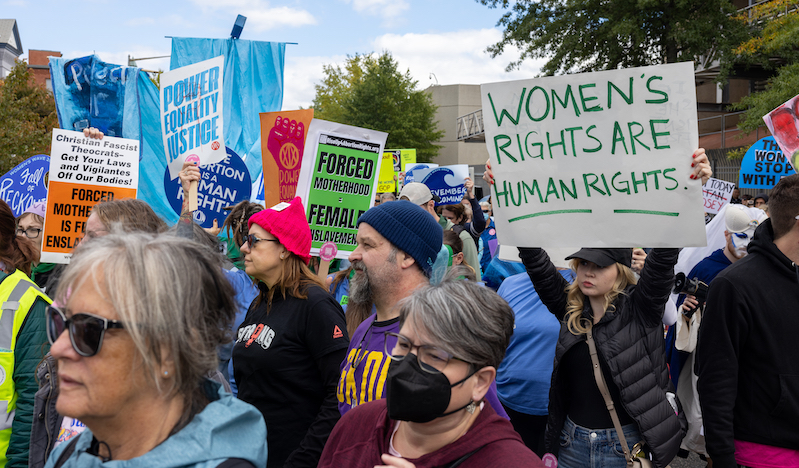
Scholar argues that the First Amendment guarantees the right to abortion.
The First Amendment guarantees an individual’s freedom of expression, which includes protection against compelled speech. But does it guarantee any protection against compelled pregnancy?
The stakes of this question are more significant than ever, as the U.S. Supreme Court has overturned Roe v. Wade—previously affirmed in Planned Parenthood v. Casey—which had guaranteed the right to abortion for over 50 years.
The central holdings of Roe and Casey established that state governments must meet a heightened legal standard to regulate abortion before fetal viability. Both cases cited the Due Process Clause of the Fourteenth Amendment as a basis for this protection, reasoning that it guarantees a right to privacy in one’s body. Yet in the majority opinion in Dobbs v. Jackson Women’s Health Organization, Justice Samuel Alito reasons that the Due Process Clause contains no sufficient grounding for an abortion right. For this reason, the majority opinion concludes, Roe and Casey were “egregiously wrong from the start” and must be overruled.
But in a recent working paper, Raymond Shih Ray Ku argues that pregnancy and childbirth should be considered expressive conduct, and so the right to abortion can derive from elsewhere in the U.S. Constitution—namely, the First Amendment. Ku, a professor at Case Western Reserve University School of Law, explains that over the last 50 years, the Supreme Court has recognized many non-speech acts as protected within the scope of the First Amendment freedom of expression. These forms of protected expression include acts such as wearing armbands, marching in parades, and displaying certain values or beliefs. Included in freedom of expression is freedom from government intervention in decisions about with whom one can or must associate. Laws that criminalize abortion, Ku contends, are coercive in violation of this constitutional right because they force individuals to remain pregnant and give birth.
Ku explains that the Supreme Court has interpreted the First Amendment to protect non-speech activities, such as the sale of commodities and data, because such conduct implicated free speech interests. And in Masterpiece Cakeshop v. Colorado Civil Rights Commission, the Supreme Court cited the First Amendment when it struck down the application of a Colorado anti-discrimination law to a wedding cake baker who objected on religious grounds to providing services to a same-sex couple. Compliance with the law, the Court held, would compel the baker to endorse a message he opposed on religious grounds, in violation of his protected First Amendment rights.
Ku contends that the reasoning underlying recent decisions extending First Amendment protection to actions as well as speech may help to establish protection for the expression implicated by regulating abortion. To determine when conduct is protected by the First Amendment, courts must consider whether the activity conveys a particularized message and the likelihood that a viewer of the action would understand that particular message. The clearer the message and the more readily it is understood, the greater the likelihood it falls within the First Amendment. And the Court should be even more interested in protecting the expressive interests at stake in personal conduct than it has been in protecting the expressive interests at stake in commercial conduct, Ku argues.
Just as a cake can convey a message, pregnancy can convey a message, Ku argues. Ku points out that pregnancy changes a person’s physical state and reproductive status, constituting information sharing. Terminating a pregnancy could constitute a decision not to share this information with others.
Ku also contends that compelled childbirth necessarily assigns an individual the identity of parent, regardless of that individual’s desires or beliefs. Upon birth, that individual’s life is altered permanently in becoming a caregiver. And, Ku continues, even though individuals may choose to give up their children to adoption, doing so necessarily conveys messages with negative connotations, such as abandonment. Absent the ability to decide to be pregnant and give birth, individuals are compelled to express ideas and assume identities that they may oppose, and these ideas, unlike in Masterpiece Cakeshop, “go to the core of human identity, dignity, and morality,” according to Ku.
In addition, Ku argues that importing the concept of personhood onto a fetus, as anti-abortion ideology does, abridges an individual’s freedom of religion in violation of the First Amendment. It violates religious liberty rights, Ku contends, because there is neither consensus nor basis for consensus about when personhood begins. Roe and Casey depend upon the viability of a fetus as the guidepost for prohibiting abortion, and anti-abortion legislation relies on personal beliefs, often religious in basis, about the sanctity of life. Adoption of legislation banning abortion forces others to endorse this viewpoint, Ku contends.
Ku emphasizes that, ultimately, the Constitution “protects liberty in general and expressly rejects the proposition that only named freedoms are guaranteed.” He urges legislators and the judiciary to remember the core constitutional issue at stake when considering laws that restrict abortion: namely, whether the government can force anyone to carry a pregnancy to term and become a parent.



